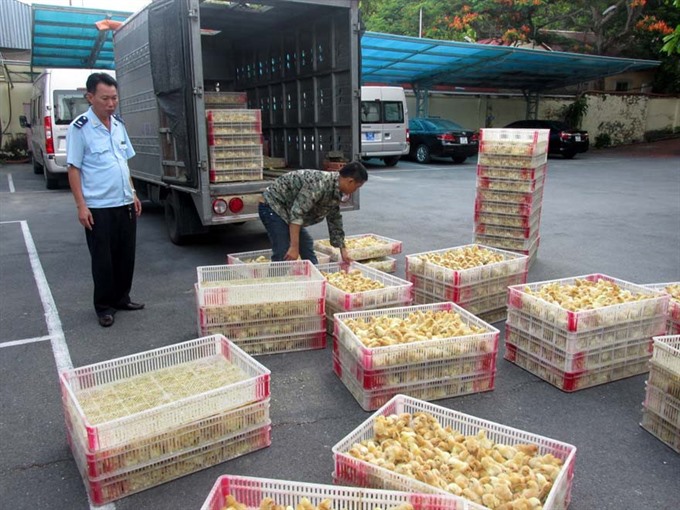 Society
Society

The Ministry of Health has ordered provinces and cities across the country to urgently conduct appropriate measures to prevent the entry of the A/H7N9 virus, commonly known as bird flu.
 |
| Customs officials of Quảng Ninh Province seize smuggled chickens in Móng Cái City. — Photo thanhnien.vn |
HÀ NỘI — The Ministry of Health has ordered provinces and cities across the country to urgently conduct appropriate measures to prevent the entry of the A/H7N9 virus, commonly known as bird flu.
Localities, especially border provinces between Việt Nam and China, have been required to crack down on the transportation, trade and slaughter of poultry and poultry products without quarantine and clear origins.
Việt Nam is on high alert after the bird flu strain A/H7N9 caused more than 100 deaths in neighbouring China, the Thanh Niên (Young People) online newspaper reported.
The ministry also recommends that citizens avoid poultry and poultry products without quarantine and clear origins, including frozen chicken.
Trần Đắc Phu, head of the General Department of Preventative Medicine warned people that infected frozen chicken and chicken eggs could still transmit the A/H7N9 virus to humans.
Price of chicken
The price of chicken has decreased in some provinces, causing trouble for poultry farmers and breeders, as well as concerns of illegal chicken imports from China.
In Bình Dương Province, the owner of a chicken farm in Bến Cát District said a kilo of live chicken now cost about VNĐ25,000 (US$1.1).
The price was VNĐ37,000 ($1.6) before Tết (Lunar New Year), even reaching VNĐ42,000 ($1.8) per kilo at times, he said.
The price for a kilo of a white-feather chicken was also down from VNĐ22,000 ($1) to VNĐ17,000 ($0.74), he said.
In HCM City, the owner of a chicken farm in Hóc Môn District said frozen chicken was for sale in rural markets with a retail price of VNĐ22,000 ($1) per kilo of chicken leg or breast, whereas it was previously between VNĐ28,000 to 30,000 ($1.2-1.3) per kilo.
According to farmers in the two provinces of Đồng Nai and Bình Dương, the reduction in demand for chicken meat after Tết was blamed on health concerns. Additionally, a large number of frozen chickens being sold at bargain prices at rural markets also exacerbated the problem.
Nguyễn Đăng Vang, chairman of the Animal Husbandry Association of Việt Nam, said we were facing a high risk that chickens from China’s bird-flu affected areas were being illegally imported into Việt Nam via unofficial channels.
Statistics from the association showed that about 100,000 tonnes of ‘waste’ chickens are still illegally imported into Việt Nam via unofficial channels each year, he said.
‘Waste’ chickens are only fit for livestock feed. However, these chickens were still found to have been brought into Việt Nam and sold on to customers.
Vang also said some companies were claiming that the poor-quality chickens were imported in order to re-export them. Thus, supervision will need to be tightened on firms engaging in such practices. — VNS




